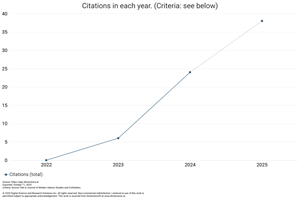Generation Z's Response to Humanitarian Issues in Gaza, Palestine
DOI:
https://doi.org/10.59653/jmisc.v3i01.1345Keywords:
humanitarian, global, unemployment, Generation Z, demandAbstract
This study aims to determine the actions of Generation Z related to the global humanitarian tragedy in Gaza. The population of this study was all Generation Z students in Kendari City—data collection through the distribution of Google Forms. The number of questionnaires filled out was 200 responses. The research period was December 2023. The results showed that most Generation Z respond to humanitarian issues without interacting directly with others (such as boycotting, praying, giving alms, and uploading news/status). Gen Z prefers using social media more than discussing humanitarian issues directly. Around 91 percent of respondents know products affiliated with Israel, and 67 percent do boycotted action. One of the reasons respondents avoided the boycott was because they thought it would worsen the economy. Boycotting a product does not mean stopping consumption but shifting consumption from one brand to another or maintaining demand. Thus, the call for a boycott must be accompanied by a more concrete explanation of its economic impact besides religiosity and humanitarianism. Local businesses/MSMEs also need to be prepared to increase their popularity and market share in the face of shifting product demand due to the boycott.
Downloads
References
Afifah, M. N., Sutopo, H., & Albab, U. (2024). Pengaruh Gerakan Boikot Produk Pro Israel Di Media Sosial Terhadap Minat Beli Masyarakat Bandar Lampung. 09(02), 426–434. https://doi.org/10.37366/jespb.v9i02.1918
Al-Modallal, I., Bahar, A., & Lee, J. (2023). The role and involvement of NGOs in activities related to humanitarian issues in Palestine. International Journal of Multidisciplinary Approach Research and Science, 1(01 SE-Articles), 49–61. https://doi.org/10.59653/ijmars.v1i01.26
Alfina, S., & Tresnawaty, Y. (2024). Pengaruh Religiositas terhadap Motivasi Boikot Produk. Satwika : Kajian Ilmu Budaya Dan Perubahan Sosial, 8(2), 439–447. https://doi.org/10.22219/satwika.v8i2.33756
Ardhani, N. D. (2023). Analisis Dampak Boikot Pro Israel Terhadap Perekonomian di Indonesia. Jurnal Oportunitas Unirow Tuban, 04(02), 13–16.
Attia, M. A. H. (2024). A call for the initiation of the forensic humanitarian action in Gaza. In Egyptian Journal of Forensic Sciences (Vol. 14, Issue 1). https://doi.org/10.1186/s41935-023-00384-9
Fakriza, R., & Ridwan, N. (2019). Pengaruh Religiusitas Terhadap Boikot Dengan Loyalitas Merek Sebagai Variabel Moderasi Pada KFC Banda Aceh. Jurnal Ilmiah Mahasiswa Ekonomi Manajemen, 4(1), 206–216.
Jaelani, A., & Nursyifa, Y. (2024). Perilaku Konsumen Terhadap Boikot Produk Israel. Karimah Tauhid, 3(2), 2312–2327. https://doi.org/10.30997/karimahtauhid.v3i2.12162
Kurniawan, R. S., Juhari, Zufriady, & Holanda, S. (2024). Efektivitas Seruan Aksi Boikot Produk Pro Israel Terhadap Keputusan Pembelian Dan Dampaknya Bagi Produk Lokal. Valuasi, Jurnal Ilmiah Ilmu Manajemen Dan Kewirausahaan, 4(2), 306–329. https://doi.org/10.46306/vls.v4i2.276
Munandar, A., Yaasin, M. S., & Firdaus, R. A. (2023). Analisis Sentimen Netizen Indonesia Mengenai Boikot Produk. Journal of Islamic Banking and Economics, 3(1), 23–40. https://doi.org/10.15408/thd.v3i1.37381
Obermaier, L. (2024). Disabling Palestine: the case of Gaza’s Great March of Return. Race and Class, 65(3). https://doi.org/10.1177/03063968231203485
Rahmani, A. N. (2023). Dampak Perang Israel-Hamas Terhadap Harga Saham Dan Minat Beli Masyarakat Produk Pendukung Israel. Academy of Education Journal, 14(2), 1444–1456. https://doi.org/10.47200/aoej.v14i2.2104
Sugandi, R., & Anggraini, R. (2024). Gerakan Sosial: Aksi Bela Palestina Boikot Produk Israel Di Kota Padang 2017-2023. CENDEKIA: Jurnal Ilmu Sosial, Bahasa Dan Pendidikan, 4(2), 01–17. https://doi.org/10.55606/cendikia.v4i2.2482
Sutrisno, Affandi, H. S., Lanonci, L., Hamka, R. A., & Taufik, E. R. (2024). Analisis Perilaku Konsumen Islam Terhadap Boikot Produk Israel. El-Mal: Jurnal Kajian Ekonomi & Bisnis Islam, 5(7), 4128–4141. https://doi.org/10.47467/elmal.v5i7.4403
Trisnawati, R. (2024). Boikot Dan Aktivisme: Perilaku Konsumen Dalam Isu Konflik Israel-Palestina. Journal of Economics Business Ethic and Science of History, 2(3), 20–25.
Wells, K., Cortés-Morales, S., Esson, J., Horgan, D., Nxumalo, F., Phoenix, A., Rautio, P., & Rosen, R. (2024). Israel’s war on Gaza and the violation of children’s rights. In Children’s Geographies (Vol. 22, Issue 2). https://doi.org/10.1080/14733285.2024.2316752
Wibowo, P., Hapsari, R. D., & Ascha, M. C. (2024). Respon Publik Terhadap Fatwa Boikot Produk Israel Oleh Majelis Ulama Indonesia. Journal Publicuho, 7(1), 382–395. https://doi.org/10.35817/publicuho.v7i1.371
Yunus, A. B. M., Wahid, N. B. A., & Hassan, W. S. B. W. (2018). Hukum Boikot Barangan Israel Berdasarkan kepada Fiqh Al-Jihad. Journal of Fatwa Management and Research, 4(1), 135–160. https://doi.org/10.33102/jfatwa.vol4no1.98
Ziiqbal, F. F., & Fitriyah, Z. (2024). Pengaruh Gerakan Media Sosial Dan Partisipasi Boikot Terhadap Minat Beli Produk Mcdonald’s Di Kalangan Mahasiswa Surabaya. COSTING: Journal of Economic, Business and Accounting, 7(5), 4666–4674.
Downloads
Published
How to Cite
Issue
Section
License
Copyright (c) 2025 Ernawati

This work is licensed under a Creative Commons Attribution-ShareAlike 4.0 International License.
Authors who publish with this journal agree to the following terms:
- Authors retain copyright and grant the journal right of first publication with the work simultaneously licensed under a Creative Commons Attribution-ShareAlike that allows others to share the work with an acknowledgement of the work's authorship and initial publication in this journal.
- Authors are able to enter into separate, additional contractual arrangements for the non-exclusive distribution of the journal's published version of the work (e.g., post it to an institutional repository or publish it in a book), with an acknowledgement of its initial publication in this journal.
- Authors are permitted and encouraged to post their work online (e.g., in institutional repositories or on their website) prior to and during the submission process, as it can lead to productive exchanges, as well as earlier and greater citation of published work (See The Effect of Open Access).
























